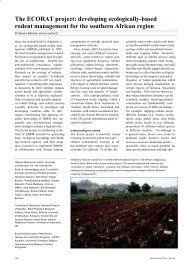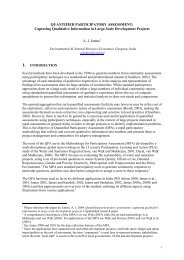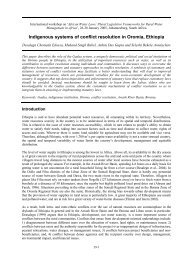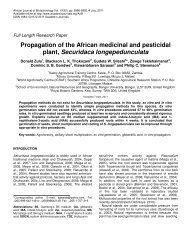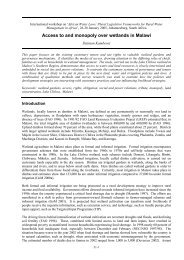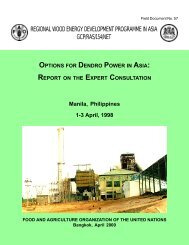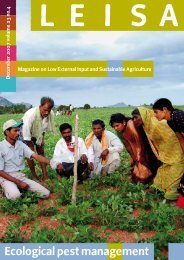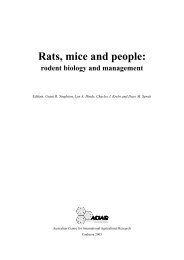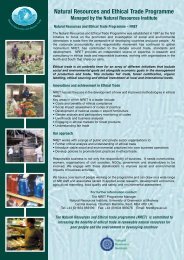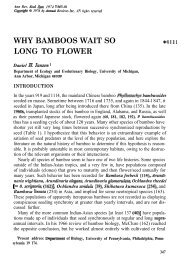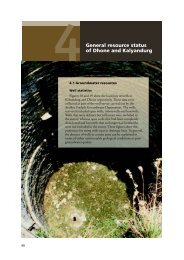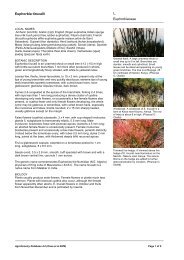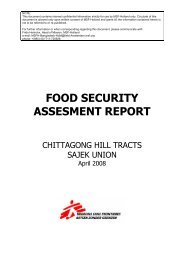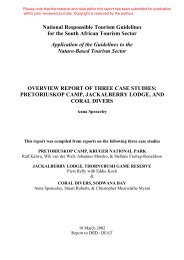Access to Rural Non-Farm Livelihoods - Natural Resources Institute
Access to Rural Non-Farm Livelihoods - Natural Resources Institute
Access to Rural Non-Farm Livelihoods - Natural Resources Institute
You also want an ePaper? Increase the reach of your titles
YUMPU automatically turns print PDFs into web optimized ePapers that Google loves.
5.5.6 Enabling fac<strong>to</strong>rs<br />
At the end of the community meeting enabling fac<strong>to</strong>rs were also identified. The first enabling<br />
fac<strong>to</strong>r identified was the formation of groups, particularly women’s groups. Following this,<br />
as in Byakabanda, there was a was a feeling that there is a strong agricultural base, the<br />
current failure of the rains notwithstanding, and enough land, which provides income and<br />
allows for diversification in<strong>to</strong> other IGAs. Strength and health, and hence the capacity for<br />
hard work, were also cited as important fac<strong>to</strong>rs.<br />
This group was less positive than the one at Byakabanda, but after some probing by the<br />
facilita<strong>to</strong>rs, it was further agreed that other enabling fac<strong>to</strong>rs included possession of relevant<br />
skills, for example handicraft skills, the relative proximity <strong>to</strong> a good main road, and the<br />
presence of NGOs in the general area.<br />
Other fac<strong>to</strong>rs identified at other times included further ideas of social capital, networking,<br />
and familial support 136 .<br />
5.6 Conclusions<br />
The economy of the village remains very heavily based on agriculture, and most of most<br />
households’ income derives from the sale of food and cash crops as well as small lives<strong>to</strong>ck<br />
and cattle, and/or paid farm labour. However, just over half of the households visited were<br />
involved in at least one non-farm IGA in addition <strong>to</strong> farming, and of those which were<br />
currently farming only, almost half had been involved in non-farm IGAs in the past. Most of<br />
the non-farm IGAs undertaken in the village are traditional in nature, with those involved in<br />
less traditional IGAs moving <strong>to</strong> trading centres, such as Lwentulege. Trading in agricultural<br />
produce and shopkeeping were reported <strong>to</strong> be the most profitable non-farm IGAs, and<br />
typically bring in more income than farming, while the other non-farm IGAs recorded tend <strong>to</strong><br />
be low profit, low barrier activities which supplement basic farming incomes, often of<br />
households under stress. In contrast <strong>to</strong> Byakabanda, a strong farming base was perceived as a<br />
very important prerequisite for entry in<strong>to</strong> a lucrative non-farm IGA. However, most of those<br />
interviewed choose or would choose <strong>to</strong> invest any extra money in trading, shopkeeping, or<br />
other retail activities, with only about a quarter electing <strong>to</strong> invest in lives<strong>to</strong>ck or crop growing<br />
activities as a first priority. Female household heads aspired <strong>to</strong> non-farm IGAs because they<br />
found doing farm work on their own <strong>to</strong>o hard and <strong>to</strong>o tiring, or were unable <strong>to</strong> do it due <strong>to</strong><br />
poor health.<br />
Most of the non-farm IGAs recorded depend on adding value <strong>to</strong> primary production, or<br />
exploiting natural resources in some way, for example trading in agricultural produce,<br />
brewing local beers, or pottery and basket and mat weaving, while others are based on<br />
providing services.<br />
The more vibrant parts of the non-farm economy of the area are not in the village, but in<br />
trading centres, such as Lwentulege, which has developed very rapidly from almost nothing<br />
in the past few years. The non-farm economy of the village, in contrast, is characterised by<br />
136 For example:<br />
“Traders get help from other traders.”<br />
Participant in the group meeting <strong>to</strong> define wealth/wellbeing groups and rank IGAs. 13/10/2000<br />
See also Boxes 12 and 18.<br />
62



